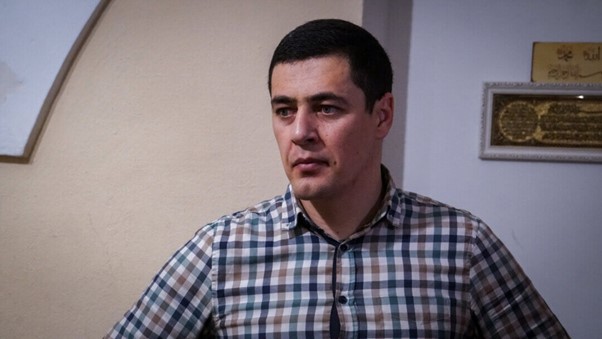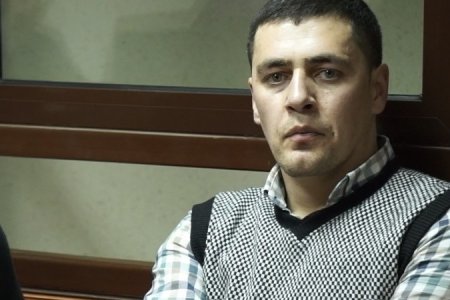
Amet Suleimanov has been sent to a harsh regime prison colony thousands of kilometres away in Russia, with the dangerously ill Crimean Solidarity civic journalist unlikely to even survive the long and gruelling journey. Russia has thus flouted an express order from the United Nations Committee against Torture and is implementing what all those involved know to be an effective death sentence.
It is not even clear when exactly Suleimanov was moved as his lawyer, Edem Semedlyaev only learned of this when he tried to visit him in the SIZO [remand prison] in occupied Crimea on 28 August. He was told that Suleimanov had been moved to another institution with the prison administration claiming to not even know which prison colony he is being taken to. It is, however, certain that he is being illegally taken from Crimea to a harsh regime prison colony in the Russian Federation. Even for political prisoners in good health, the lengthy journey with stops at various prisons along the way is arduous and dangerous, as the prisoners have no contact with their lawyers and family. They also normally have the medication that their families have managed to obtain for them taken away. In Amet’s case, the situation is quite simply critical.
Suleimanov (b. 1984) suffers from chronic rheumatic heart disease, aortic insufficiency, coronary artery disease and third level mitral valve prolapse (making a heart valve transplant both vital and urgent). Even according to Russian legislation, he should never have been placed in detention.
Russia is a party to the Convention against Torture and Other Cruel, Inhuman or Degrading Treatment or Punishment. Moscow’s customary refrain when UN bodies, like the Committee against Torture, or international courts demand that it complies with international law is to deny that they have jurisdiction. It cannot do so in this case, since Russia has declared under Article 22 of the Convention “that it recognizes the competence of the Committee to receive and consider communications from or on behalf of individuals subject to its jurisdiction who claim to be victims of a violation” by Russia.”
Yet, on 22 February 2023, the UN’s Committee against Torture called upon Russia to abstain from implementing the 12-year prison sentence passed against the civic journalist and recognized political prisoner. It also asked Russia to ensure that Suleimanov received a comprehensive medical examination in a specialized medical facility, as well as heart surgery and/or treatment in accordance with the results of the examination.
It is quite clear that the Russian and the occupation authorities in Crimea were aware of this order. Suleimanov was even visited in the SIZO by the Russian occupation prosecutor who asked if he had “any complaints”. Suleimanov answered that the very fact that he was being held in the SIZO was unwarranted and illegal. It is unclear whether the prosecutor later lied and claimed that Suleimanov had no ‘complaints’,, or whether all those implicated in this torture of a political prisoner are simply assuming that Russia can violate its obligations under international conventions (including the Convention against Torture) with impunity.
Amet Suleimanov was taken into custody on 5 April, with the SIZO staff even taking his medication away and placing him in a damp and stuffy cell, where he was permanently breathless and in physical distress.
Persecuted for his civic journalism
The Russian FSB came for Amet Suleimanov (b. 1984); the two elder sons of a renowned Crimean Tatar historian – Seitumer Seitumerov (1988) and Osman Seitumerov (b. 1992) and their maternal uncle Rustem Seitmemetov (b. 1973) on 11 March 2020.
The charges against all of the men differed little from those used during Stalin’s Terror to execute the great-grandfather of Seitumer and Osman Seitumerov. Under Stalin, they claimed ‘counter-revolutionary terrorist propaganda’. In contemporary Russia, they use a deeply flawed Supreme Court ruling from 2003 to imprison men on ‘terrorism’ charges without even accusing them of a recognizable crime, let alone coming up with convincing evidence. The ruling declared the peaceful pan-Muslim Hizb ut-Tahrir organization, which is legal in Ukraine and not known to have committed acts of terror anywhere in the world, ‘terrorist’. Russia has been using this ruling since 2015 in occupied Crimea as a weapon of repression, especially against Crimean Tatar civic journalists and activists. No proof is even needed of actual involvement in Hizb ut-Tahrir, since the FSB invariably plant ‘prohibited literature’ which they then claim to have found during armed searches which lawyers are pretended from being that. They then send illicit tapes innocuous conversations about religion, Russian persecution, events in Crimea to their own FSB-‘experts’ and use ‘anonymous witnesses’ who invariably repeat the indictment. All of this is seen and clearly understood by the ‘judges’ who prevent the defence from asking questions which demonstrate that such ‘witnesses’ are lying and that the ‘experts’ have no competence to express an opinion.
Seitumer Seitumerov was charged under the more serious Article 205.5 § 1 of Russia’s criminal code with ‘organizing a Hizb ut-Tahrir group’, while his brother, uncle and Suleimanov were charged with ‘involvement’ in this entirely unproven ‘group’, under Article 205.5 § 2. All of the men were also accused of ‘planning a violent uprising’ (Article 278) although even the FSB admitted that not one of them was suspected of actions or direct plans to commit any action aimed at ‘overthrowing the Russian constitutional order’
The three family members were immediately remanded in custody and remain imprisoned to this day. Suleimanov was held under house arrest, ‘attending’ the ‘trial’ via video link from occupied Crimea.
Despite the flawed charges, non-existent evidence and the fact that any custodial sentence would kill one of the men, prosecutor Yevgeny Nadolinsky demanded horrific sentences against all four men, including 13 years in the case of Suleimanov (whom he had previously tried to get remanded in custody). On 29 October 2021, three ‘judges’ from the Southern District Military Court in Rostov (Russia) - Igor Kostin (presiding judge); Roman Plisko and Yevgeny Zviagin – largely obliged, sentencing Seitumer Seitumerov to 17 years; Osman Seitumerov to 14 years; Rustem Seitmemetov to 13 years and Amet Suleimanov to 12 years. All of these sentences are for the worst of Russian penal institutions, with the first 3.5 years to be spent in a prison, where the conditions are most shocking.
These sentences were upheld on 9 February 2023, by ‘judge’ Aleksandr Aleksandrovich Mordovin from the Military Court of Appeal in Vlasikha (Moscow region).
On 24 August, the Russian FSB came for six more Crimean Solidarity civic activists, including the last and youngest son of historian Shukri Seitumerov and his wife Lilia. 23-year-old Abdulmedzhit Seitumerov is now facing the same horrific sentences, without any crime, as his brothers (see: Russian FSB seize Crimean Tatar family’s last son in new wave of terror against Crimean Solidarity activists )
And Russia is exacting an effective death sentence against Amet Suleimanov.

